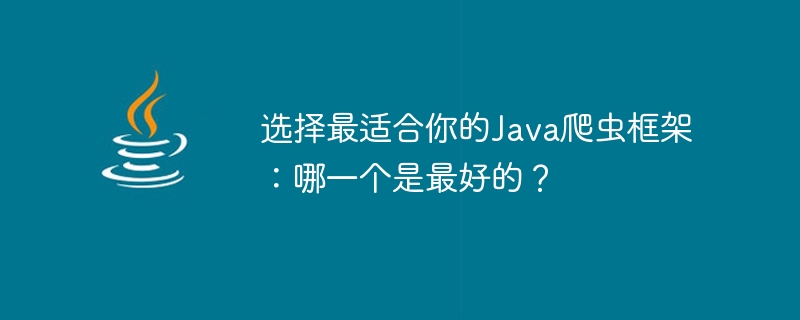

Choose the best Java crawler framework for you: Which one is the best?
With the development of the Internet, obtaining and analyzing network data has become increasingly important. As a powerful programming language, Java has many excellent crawler frameworks to choose from. However, with so many choices, how to find the framework that best suits you becomes an important question. In this article, I will introduce several commonly used Java crawler frameworks and provide corresponding code examples to help you make a better choice.
Jsoup is a Java library for processing HTML and XML documents. It provides a concise API that makes parsing and manipulating documents very easy. Here is an example of using Jsoup to crawl a web page and get the title and all links:
import org.jsoup.Jsoup; import org.jsoup.nodes.Document; import org.jsoup.nodes.Element; import org.jsoup.select.Elements; public class JsoupExample { public static void main(String[] args) { try { String url = "https://example.com"; Document document = Jsoup.connect(url).get(); String title = document.title(); System.out.println("标题: " + title); Elements links = document.select("a[href]"); for (Element link : links) { String href = link.attr("href"); System.out.println("链接: " + href); } } catch (Exception e) { e.printStackTrace(); } } }
HttpClient is a widely used Java HTTP client library that can Used to send HTTP requests and process HTTP responses. Here is an example of using HttpClient to send a GET request and print the response content:
import org.apache.http.HttpEntity; import org.apache.http.client.methods.CloseableHttpResponse; import org.apache.http.client.methods.HttpGet; import org.apache.http.impl.client.CloseableHttpClient; import org.apache.http.impl.client.HttpClients; import org.apache.http.util.EntityUtils; public class HttpClientExample { public static void main(String[] args) { try (CloseableHttpClient httpClient = HttpClients.createDefault()) { String url = "https://example.com"; HttpGet httpGet = new HttpGet(url); try (CloseableHttpResponse response = httpClient.execute(httpGet)) { HttpEntity entity = response.getEntity(); String content = EntityUtils.toString(entity); System.out.println("响应内容: " + content); } } catch (Exception e) { e.printStackTrace(); } } }
Selenium is a powerful web automation framework that can simulate users through the browser the behavior of. Its interaction with the browser makes it ideal for working with JavaScript-generated content. The following is an example of using Selenium to open a browser and take a screenshot of a web page:
import org.openqa.selenium.WebDriver; import org.openqa.selenium.chrome.ChromeDriver; public class SeleniumExample { public static void main(String[] args) { System.setProperty("webdriver.chrome.driver", "path/to/chromedriver"); WebDriver driver = new ChromeDriver(); try { String url = "https://example.com"; driver.get(url); driver.manage().window().maximize(); driver.manage().timeouts().implicitlyWait(10, TimeUnit.SECONDS); File screenshot = ((TakesScreenshot) driver).getScreenshotAs(OutputType.FILE); FileUtils.copyFile(screenshot, new File("path/to/screenshot.png")); } catch (Exception e) { e.printStackTrace(); } finally { driver.quit(); } } }
Through the above code examples, we can see that different crawler frameworks have different characteristics and advantages in the process of crawling web page data. . Jsoup is suitable for processing simple HTML and XML documents, HttpClient is suitable for sending HTTP requests and processing responses, and Selenium is suitable for processing JavaScript-generated content. When choosing a crawler framework, you need to make trade-offs and choices based on specific needs and scenarios.
Although the above frameworks provide rich functionality, these are just a few examples, and there are many other excellent crawler frameworks to choose from. By comparing and evaluating frameworks, choosing the most suitable framework based on your own needs is the best choice.
The above is the detailed content of How to choose the best Java crawler framework for you: Which one is the best choice?. For more information, please follow other related articles on the PHP Chinese website!